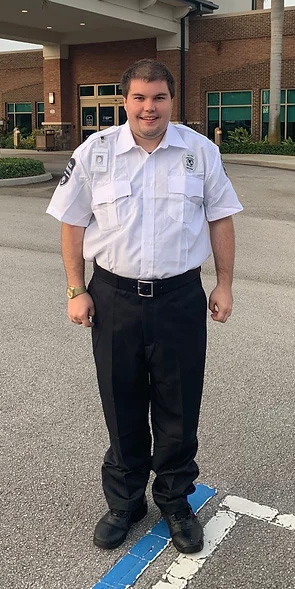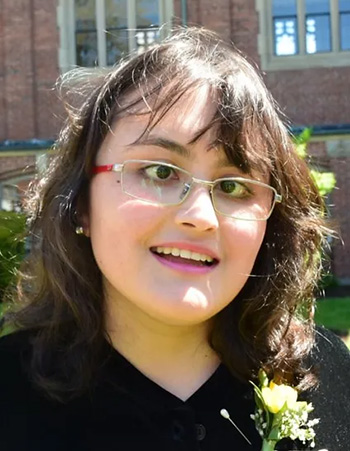Meet Florida's SDM Pioneers
SDM is already improving the lives of people with disabilities in Florida.
SDM is already improving the lives of people with disabilities in Florida.
 Michael Lincoln-McCreight is the first person in Florida to terminate his guardianship using Supported Decision-Making (SDM).
Michael Lincoln-McCreight is the first person in Florida to terminate his guardianship using Supported Decision-Making (SDM).
Six years ago, Michael was a young adult with a developmental disability who participated in the Sheriff’s Explorers, volunteered at hospitals, went to church, and loved movies. But when a professional guardian filed a petition to find him incapacitated, all that changed. In September 2014, the Circuit Court of St. Lucie County declared Michael incapacitated. Though required by law to consider less restrictive alternatives, the court took away all of Michael's rights and appointed the public guardian to make all decisions for him. Michael's guardian restricted his every move and relationship, making his quality of life worse than before the guardianship.
Wanting to get his independence back, Michael contacted Disability Rights Florida for help. After fighting his case alongside his attorney, in 2016, a St. Lucie County judge finally terminated Michael's guardianship. The judge found that SDM was the least restrictive appropriate alternative to guardianship for Michael and that Michael could exercise his own rights using SDM. Months later, when Michael was invited to a podcast, he finally had the right to accept. He relied on his supporters to travel to Tallahassee, calling his uncle for advice and asking his friend for help buying a bus ticket.
Today, Michael is a Self-Advocate who works with organizations like Stand Up for Independence, Family Care Counsel, and Disability Rights Florida to defend the rights of people with disabilities and promote SDM. Michael co-chairs SDM4FL, a coalition working to pass an SDM law so that all people with disabilities in Florida can have the chance he did to direct their own lives. Michael graduated from Indian River State College in 2020 with a Certificate in Security. Fulfilling his lifelong dream, he now works as a Security Guard for Universal Security Services.
Michael loves visiting Florida's theme parks and hanging out with his friends.
 My name is Sofia Causa, and I am 21 years old and I am from Miami, Florida. I have a passion for music; I play violin and piano. I have been playing violin for 12 years and I was in an orchestra during middle, high school, and college until the pandemic hit. I have been playing piano for 15 years.
My name is Sofia Causa, and I am 21 years old and I am from Miami, Florida. I have a passion for music; I play violin and piano. I have been playing violin for 12 years and I was in an orchestra during middle, high school, and college until the pandemic hit. I have been playing piano for 15 years.
I have a disability in which I have low vision and I only can see centrally from my left eye. I have had that disability since birth. My disability not only has to do with my vision, but also in my way of perceiving and making decisions. I use a system called Supported Decision-Making (SDM). How I define Supported Decision-Making is when you have family or friends who help you decide. They can give you perspective on the pros and cons, but the idea is still to ultimately make the decision on your own.
Last summer, I made a SDM declaration. This is a statement saying the areas I want support with, and how I want to be supported. I gave a copy to my mom and will share it with other people if I want to.
I have used Supported Decision-Making to make big, important choices and/or smaller trivial ones. Some examples in which I used Supported Decision-Making was when I was trying to decide what pathway I was going to take after high school. I was going to choose which residential program I wanted to attend that was for students with visual impairments. I was choosing between a 4-week program in Daytona, Florida or a 9-month program in Boston, Massachusetts. Before I made the decision, I sat down with my mom and stepdad to talk about the pros and cons of each one. I finally decided to attend the 9-month program in Boston. This program took place at the Perkins School for the Blind, and it was to teach students what life is like in college. We took classes through Harvard Extension to know what a college class is like, and there were also teachers there who taught us life skills, like orientation and mobility (navigating in the community) and independent living skills (cooking, cleaning, laundry, etc.). My mom and I talk about small decisions too. For example, if I am going to an event, she helps me decide on what to wear or if I am coordinating it, we discuss what time would be best.
I think it matters very much to me to make my own decisions because it is important to make your own decisions because it is going to serve you for life. When I went to live in that program in Boston, I was learning what it was like to make decisions on my own, because I did not have any of my family there and it was meant to prepare students for independence in college. I had to decide whether I wanted to go to an outing or stay in the dorm to finish homework or anything else.
I think that Supported Decision-Making is better than a guardianship because it is less restrictive than having a guardianship. A Supported Decision-Making statement, or an agreement as many others use them, can be kept flexible, and that is helpful because if one person is not available to help you, you can have a backup. This is why the Supported Decision-Making bill, introduced as Senate Bill 1010 and House Bill 681, is a good idea. It should be passed so that families have flexibility and more options. All people with disabilities are different. The good thing about SDM is that you can adapt it to each person with a disability, so it works for them. I am a good example of that, because even though a lot of people use SDM as an agreement, for me a declaration was better. I want every person with a disability to have choices.
These videos feature decision-makers and their supporters, across the United States, discussing how they work together using SDM.
Want to keep up with the latest news, events and happenings? Simply enter your email address, and click “Sign me up!” to receive the Disability Rights Florida email newsletter.
We care about your privacy and trust and will never share or sell your email address.